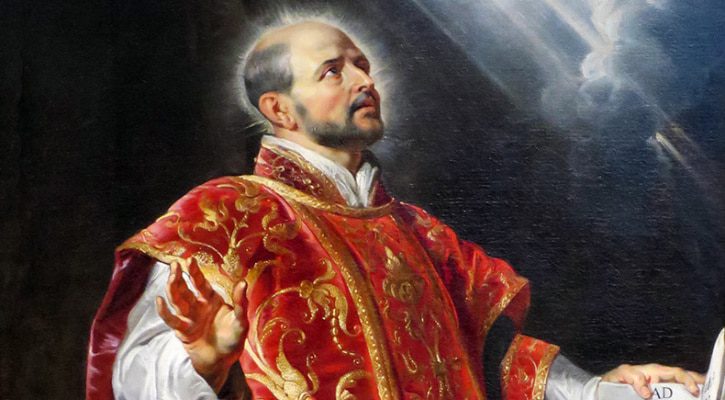
Image: St. Ignatius of Loyola | Peter Paul Rubens
Saint of the Day for July 31
(October 23, 1491 – July 31, 1556)
Saint Ignatius of Loyola’s Story
The founder of the Jesuits was on his way to military fame and fortune when a cannon ball shattered his leg. Because there were no books of romance on hand during his convalescence, Ignatius whiled away the time reading a life of Christ and lives of the saints. His conscience was deeply touched, and a long, painful turning to Christ began. Having seen the Mother of God in a vision, he made a pilgrimage to her shrine at Montserrat near Barcelona. He remained for almost a year at nearby Manresa, sometimes with the Dominicans, sometimes in a pauper’s hospice, often in a cave in the hills praying. After a period of great peace of mind, he went through a harrowing trial of scruples. There was no comfort in anything—prayer, fasting, sacraments, penance. At length, his peace of mind returned.
It was during this year of conversion that Ignatius began to write down material that later became his greatest work, the Spiritual Exercises.
He finally achieved his purpose of going to the Holy Land, but could not remain, as he planned, because of the hostility of the Turks. Ignatius spent the next 11 years in various European universities, studying with great difficulty, beginning almost as a child. Like many others, his orthodoxy was questioned; Ignatius was twice jailed for brief periods.
In 1534, at the age of 43, he and six others—one of whom was Saint Francis Xavier—vowed to live in poverty and chastity and to go to the Holy Land. If this became impossible, they vowed to offer themselves to the apostolic service of the pope. The latter became the only choice. Four years later Ignatius made the association permanent. The new Society of Jesus was approved by Pope Paul III, and Ignatius was elected to serve as the first general.
When companions were sent on various missions by the pope, Ignatius remained in Rome, consolidating the new venture, but still finding time to found homes for orphans, catechumens, and penitents. He founded the Roman College, intended to be the model of all other colleges of the Society.
Ignatius was a true mystic. He centered his spiritual life on the essential foundations of Christianity—the Trinity, Christ, the Eucharist. His spirituality is expressed in the Jesuit motto, Ad majorem Dei gloriam—“for the greater glory of God.” In his concept, obedience was to be the prominent virtue, to assure the effectiveness and mobility of his men. All activity was to be guided by a true love of the Church and unconditional obedience to the Holy Father, for which reason all professed members took a fourth vow to go wherever the pope should send them for the salvation of souls.
Reflection
Luther nailed his theses to the church door at Wittenberg in 1517. Seventeen years later, Ignatius of Loyola founded the Society that was to play so prominent a part in the Catholic Reformation. He was an implacable foe of Protestantism. Yet the seeds of ecumenism may be found in his words: “Great care must be taken to show forth orthodox truth in such a way that if any heretics happen to be present they may have an example of charity and Christian moderation. No hard words should be used nor any sort of contempt for their errors be shown.” One of the greatest ecumenists was the 20th-century German Jesuit, Cardinal Augustin Bea.
Saint Ignatius of Loyola is the Patron Saint of:
Retreats
Love the saints? Check out these seven titles on Catholic saints!
Posted by Franciscan Media.
Daily Reading
Feast of Saint Stephen, first martyr
Reading 1 Acts 6:8-10; 7:54-59 Stephen, filled with grace and power,was working great wonders and signs among the people.Certain members of the so-called Synagogue of Freedmen,Cyrenians, and Alexandrians,and people from…
Daily Meditation
Joy in the Midst of Sorrow
Click here for daily readings It’s always been odd to me to have a feast of the first martyr the day after Christmas. Yes, as Christians, we know difficult things…




